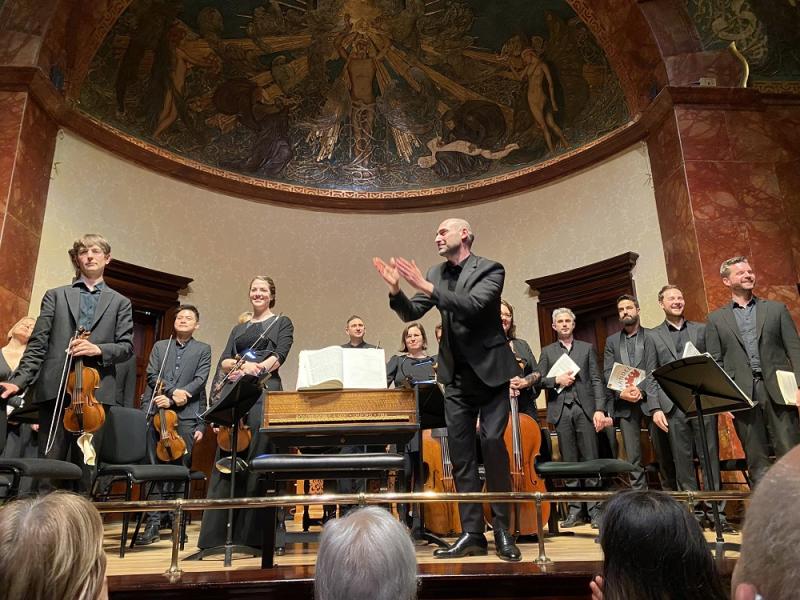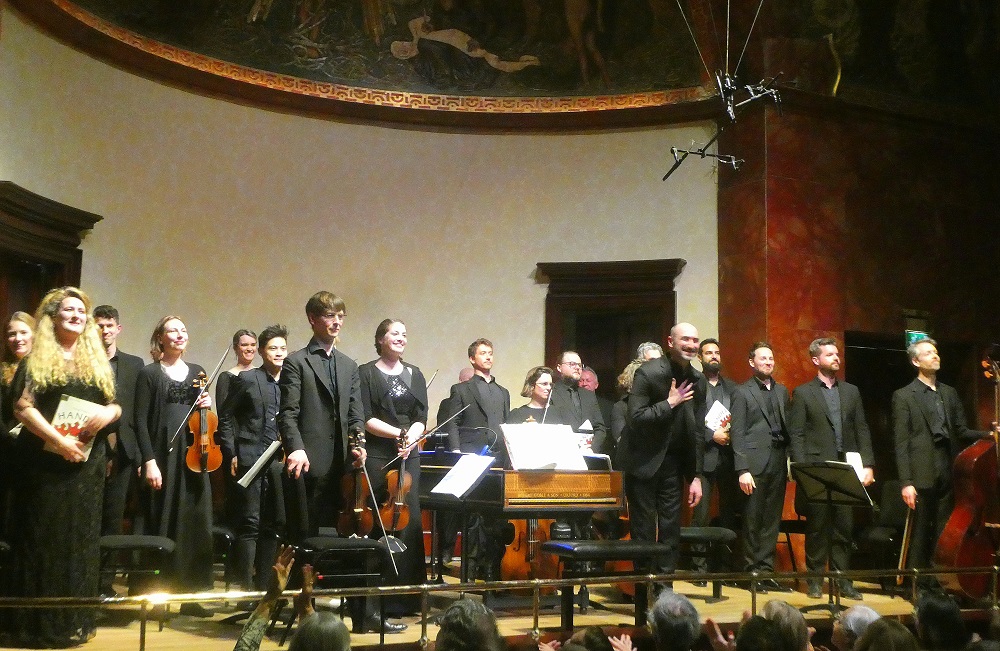Messiah, Irish Baroque Orchestra, Whelan, Wigmore Hall review - wonderful, easy, light and dark in perfect poise | reviews, news & interviews
Messiah, Irish Baroque Orchestra, Whelan, Wigmore Hall review - wonderful, easy, light and dark in perfect poise
Messiah, Irish Baroque Orchestra, Whelan, Wigmore Hall review - wonderful, easy, light and dark in perfect poise
The original 1742 Dublin version soars in the hands of a wondrous small ensemble

This Palm Sunday served up an epiphany. Previous encounters with Handel's Messiah, in whatever version, and whether listening or performing, turned out to have been through a glass darkly. And here we were face to face with undiluted genius, served with total consistency by 26 musicians running the gamut from intimacy through fury to great blazes, all guided by the extraordinary spirit of IBO artistic director Peter Whelan.
You’ll perhaps have noticed that the choir is without a name. Clearly the Irish Baroque Orchestra needs one of its own, and these 12 would be the dream team – perhaps eight would be more practical, with four more to call on for the soloists, here the best I’ve ever heard in their roles. Not least because there was utter consistency between the four in some infinitely long lines, made possible by Whelan’s often fleet but never rushed tempi, expressive ornamentation in da capo phrases and the same sense of vibrant meaning which informed the performance as a whole, especially in the polarities of light and dark, heaven and earth.
If the infinite depths sounded by Helen Charlston, most distinctive of contraltos, were the most moving thing in an astonishing evening, that’s because “He was despised” is also that when performed at the highest level. But there was expressive perfection, too, in the meat of Anthony Gregory’s “Ev’ry valley”, Hilary Cronin’s “Rejoice greatly” (the romping original version) and “I know that my Redeemer liveth” (much needed balm after so many preceding choral thrills), and Edward Grint’s “The trumpet shall sound”, not only with sterling personality from trumpeter Darren Cornish Moore upping the stakes, but a line on “immortality” that seemed to go on for ever: astounding breath control, like the other three. (In the full line-up pictured below Cronin is on the left, Charlston between two violinists, leader Matthew Truscott in foreground, Whelan with hand on heart and Edward Grint second from the right). Credit is also due to countertenors Mark Chambers and Nathan Mercieca, and bass Frederick Long, for briefer soloistic moments in the sun, but then all the participants in the 12-strong choir deserve an accolade.
None of the great blazes disappointed (starting with “Wonderful, Counsellor” in “For unto us”), but Whelan also made capital of his intimate forces, starting with a Sinfony which was inward, not gut-aggressive, and allowing the chorus, followed by the strings, to launch into the final “Amens” with soulfulness – an unexpected last-minute meditation amidst the clouds of glory. It was good, not so incidentally, to see consummate violinist Matthew Truscott again, after his more dominant role in last Thursday's more introspective, smaller-scale but equally classy, five-star Handel evening. An extra pleasure last night was seeing the delight everyone – singers and players – took in each other's achievements.
“Dublin ovations” are notorious – everyone there stands at the end for just about everything – but the Wigmore Hall audiences are less easy to bring to their feet. That happened last night, for very good reason, and the whole evening effectively meant that I’ll not seek out a live Messiah for the next few years. There might be different interpretations, but there can’t be a more vivid one.
rating
Share this article
The future of Arts Journalism
You can stop theartsdesk.com closing!
We urgently need financing to survive. Our fundraising drive has thus far raised £49,000 but we need to reach £100,000 or we will be forced to close. Please contribute here: https://gofund.me/c3f6033d
And if you can forward this information to anyone who might assist, we’d be grateful.

Subscribe to theartsdesk.com
Thank you for continuing to read our work on theartsdesk.com. For unlimited access to every article in its entirety, including our archive of more than 15,000 pieces, we're asking for £5 per month or £40 per year. We feel it's a very good deal, and hope you do too.
To take a subscription now simply click here.
And if you're looking for that extra gift for a friend or family member, why not treat them to a theartsdesk.com gift subscription?
more Classical music
 Echo Vocal Ensemble, Latto, Union Chapel review - eclectic choral programme garlanded with dance
Beautiful singing at the heart of an imaginative and stylistically varied concert
Echo Vocal Ensemble, Latto, Union Chapel review - eclectic choral programme garlanded with dance
Beautiful singing at the heart of an imaginative and stylistically varied concert
 Scott, Irish Baroque Orchestra, Whelan, RIAM, Dublin review - towards a Mozart masterpiece
Characteristic joy and enlightenment from this team, but a valveless horn brings problems
Scott, Irish Baroque Orchestra, Whelan, RIAM, Dublin review - towards a Mozart masterpiece
Characteristic joy and enlightenment from this team, but a valveless horn brings problems
 Classical CDs: Voice flutes, flugelhorns and froth
Baroque sonatas, English orchestral music and an emotionally-charged vocal recital
Classical CDs: Voice flutes, flugelhorns and froth
Baroque sonatas, English orchestral music and an emotionally-charged vocal recital
 Kanneh-Mason, Britten Sinfonia, Shave, Milton Court - a grin and a big beaming smile
A pair of striking contemporary pieces alongside two old favourites
Kanneh-Mason, Britten Sinfonia, Shave, Milton Court - a grin and a big beaming smile
A pair of striking contemporary pieces alongside two old favourites
 theartsdesk at the New Ross Piano Festival - Finghin Collins’ musical rainbow
From revelatory Bach played with astounding maturity by a 22 year old to four-hand jazz
theartsdesk at the New Ross Piano Festival - Finghin Collins’ musical rainbow
From revelatory Bach played with astounding maturity by a 22 year old to four-hand jazz
 First Person: Manchester Camerata's Head of Artistic Planning Clara Marshall Cawley on questioning the status quo
Five days of free events with all sorts of audiences around Manchester starts tomorrow
First Person: Manchester Camerata's Head of Artistic Planning Clara Marshall Cawley on questioning the status quo
Five days of free events with all sorts of audiences around Manchester starts tomorrow
 Goldscheider, Brother Tree Sound, Kings Place review - music of hope from a young composer
Unusual combination of horn, strings and electronics makes for some intriguing listening
Goldscheider, Brother Tree Sound, Kings Place review - music of hope from a young composer
Unusual combination of horn, strings and electronics makes for some intriguing listening
 theartsdesk Q&A: composer Donghoon Shin on his new concerto for pianist Seong-Jin Cho
Classical music makes its debut at London's K-Music Festival
theartsdesk Q&A: composer Donghoon Shin on his new concerto for pianist Seong-Jin Cho
Classical music makes its debut at London's K-Music Festival
 Helleur-Simcock, Hallé, Wong, Bridgewater Hall, Manchester review - moving lyricism in Elgar’s concerto
Season opener brings lyrical beauty, crisp confidence and a proper Romantic wallow
Helleur-Simcock, Hallé, Wong, Bridgewater Hall, Manchester review - moving lyricism in Elgar’s concerto
Season opener brings lyrical beauty, crisp confidence and a proper Romantic wallow
 Kohout, Spence, Braun, Manchester Camerata, Huth, RNCM, Manchester review - joy, insight, imagination and unanimity
Celebration of the past with stars of the future at the Royal Northern College
Kohout, Spence, Braun, Manchester Camerata, Huth, RNCM, Manchester review - joy, insight, imagination and unanimity
Celebration of the past with stars of the future at the Royal Northern College

Add comment